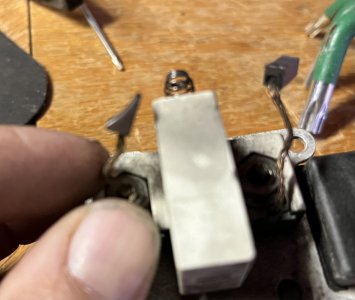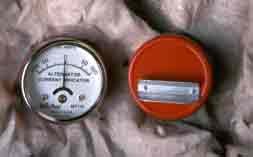1989 Bronco II XLT:
Found out I'm not charging so I had my alternator check at O'rielly's and it was bad. Got a used one at a yard for $35. Got them home and noticed that the one I got at the yard had a clicking noise at each rotation, not a good sign. So I thought I would just switch out the (internal) voltage regular. I first removed the VR from the original Bronco 'bad' alternator and found they were almost worn down to nothing. Then I removed the VR from the alternator I just got from the yard, they were a little better but worn down also. So...I put the VR from the yard into the original 'bad' alternator and will install it to see if it'll work.
I noticed that I can purchase a new alternator brush kit from the auto parts store for only around $5.00 and I'm wondering if those brushes are mostly the same size. I measured mine and they are .155 x .295.
I've included a pic of the original brushes.
All this leads me to my main question: Do alternators fail mostly due to worn brushes and brush problems?
Found out I'm not charging so I had my alternator check at O'rielly's and it was bad. Got a used one at a yard for $35. Got them home and noticed that the one I got at the yard had a clicking noise at each rotation, not a good sign. So I thought I would just switch out the (internal) voltage regular. I first removed the VR from the original Bronco 'bad' alternator and found they were almost worn down to nothing. Then I removed the VR from the alternator I just got from the yard, they were a little better but worn down also. So...I put the VR from the yard into the original 'bad' alternator and will install it to see if it'll work.
I noticed that I can purchase a new alternator brush kit from the auto parts store for only around $5.00 and I'm wondering if those brushes are mostly the same size. I measured mine and they are .155 x .295.
I've included a pic of the original brushes.
All this leads me to my main question: Do alternators fail mostly due to worn brushes and brush problems?


